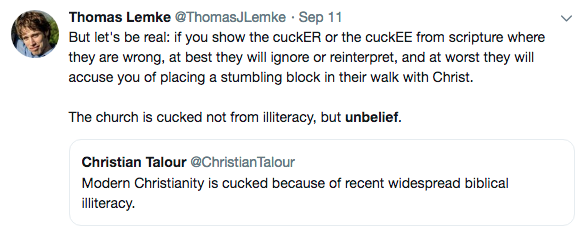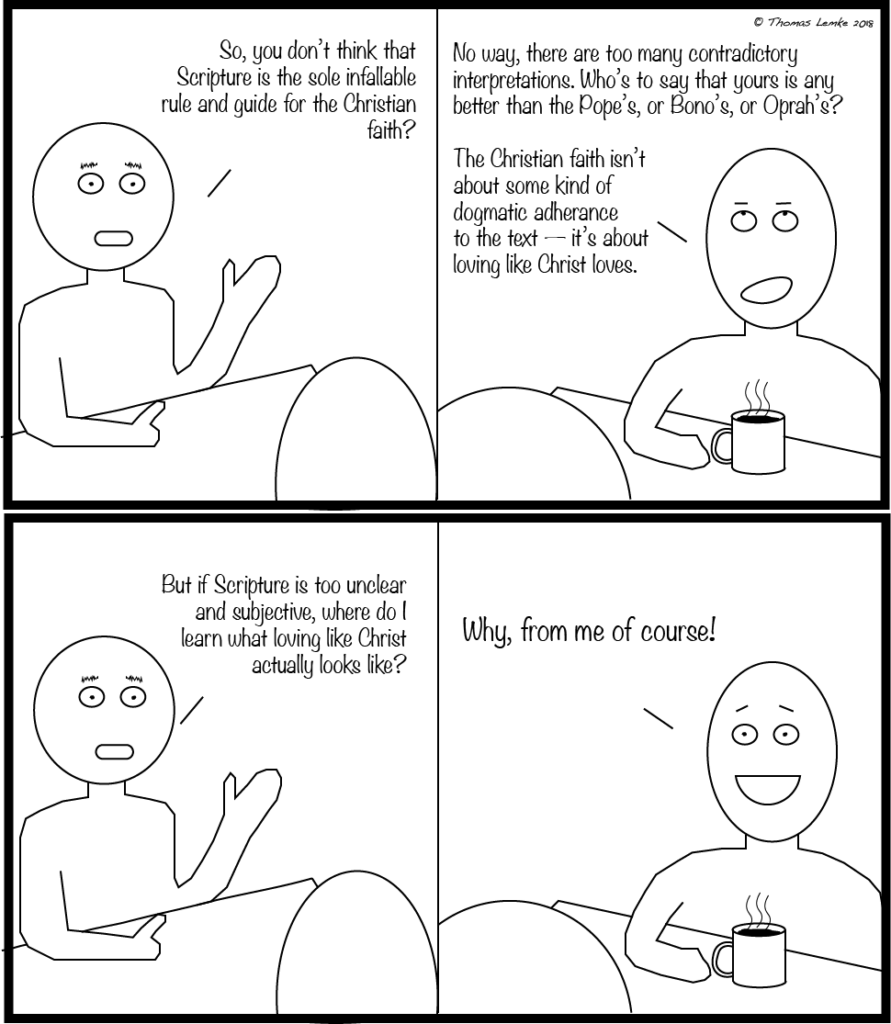In the past few months, I’ve grown increasingly convinced that the problems the modern Church faces are because Christians are too embarrassed to speak with the plain words and teachings of Scripture.
And they are embarrassed because of nothing less than simple unbelief.

This is what I was getting at, in part, when I wrote my parable about softening the “hard parts” of Scripture to appease the scoffers. Rather than standing firm and resolute in what the oracles of God actually reveal, I see all about me endless attempts to remove any aspect deemed “offensive” — or at least to reinterpret it in a “non-offensive” way.
Oftentimes this goal is served by making the thing in question an abstraction. A theoretical. A thought experiment, not to be confessed, but offered for consideration and pontificated endlessly upon without ever coming ’round to speaking aloud Scripture’s plain conclusion on the matter.
Again, this is a tendency I’ve only just become seriously dialed in on, so I’m in the preliminary stages of working out a cogent articulation of it. Hence why I started with a story, where I was able to focus on patterns and themes instead of a systematized statement of the thesis I perceive to be in operation, and my rebuttal thereof. God willing, I’ll be able to continue to explore this theme and its implications in more of a direct manner moving forward.
Apropos of the above, I want to share a Facebook conversation I had last week. It’s a real-life example of rhetorical games that sound devout and pious while allowing the individual that employs them to avoid exposing themselves to the ridicule of an unbelieving culture.
This is exactly the phenomenon I want to dig into more in the coming days.
Original Poster:
How you react to this story says much about what you believe Christ is like.
If you think Ms. Daigle did not do enough to push an Evangelical interpretation of Scripture onto her hearers then you likely define Christlikeness as how much you know and do.
You care about truth and believe depth is found in your mind, specifically in your right belief about the world. You are constantly disappointed in “leaders” who do not meet the standard and might not even know Jesus at all. You believe telling them about their error is the kindest thing you can do for them. You see Jesus primarily as judge.
If you think Ms. Daigle is blessed with a platform and doing the best she can to point others to Jesus while being in proximity and even community with them, then you define Christlikeness as how you love.
You care about people even if you do not agree with them because you know they are loved by God. You learned this the hard way through the spiritual desert when God felt absent. You believe depth is found in the heart of God’s love for people and see Jesus primarily as the Good Shepherd who chases down his lost sheep.
What do you think Jesus is like?
Tom:
Can we define “Christlikeness” as believing in Scripture, and speaking with it both in season and out of season?
Our problem in this age is not centrally what flavor or nuance we put on God, but whether we believe what he has said. And, moreover, whether we are willing to confess it, or bite our tongues to avoid the condemnation of the world.
Scripture is replete with warnings not to be ashamed of what God and his Christ have said. We can do thought experiments that make ourselves feel good by abstracting concepts to the point of fundamental meaninglessness, or we can boldly proclaim the whole council of God.
This world, like this woman, does not suffer from biblical illiteracy; it suffers from unbelief.
Original poster:
Tom, I define Christlikeness as loving as Christ loves. The trouble with defining it as correct belief is pretty clear in the number of interpretations and denominations we have. Who gets to say? You? The Pope? It’s all very subjective (though most people who define it this way don’t think so).
Tom:
The problem of trying not to define Christianity (at least in part) as correct belief is that it ends in a fake Jesus.
This is a dangerous practice, and surely not new. It is to be exposed, challenged, and even ridiculed, in the hopes that those who operate in this way will come to believing repentance.

The post Master, what must I do to avoid confessing with Scripture? appeared first on The Chi Files.